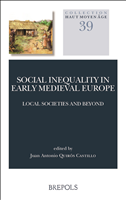Social Inequality in Early Medieval Europe : Local Societies and Beyond
360 p.
The goal of this book is to discuss the theoretical challenges posed by the study of social and political inequality of local societies in Western Europe during the Early Middle Ages. Traditional approaches have defi ned rural communities as passive bodies, poor and unstable in the framework of a self-suffi cient economy. In the last few decades, social approaches both in medieval history and archaeology have neglected the opportunity to re-evaluate the role of peasantry and other subaltern groups, even where new written and material evidence has challenged traditional assumptions. Conversely, scholars focussing on elites and aristocracies have promoted powerful research agenda.As a consequence of the 2007-2008 recession, the social sciences began to be interested in social and economic inequality, opening up new avenues for a reassessment of social history. The early medieval period has been identifi ed by numerous scholars as a key arena for the analysis of political complexity and social inequality in long
-term perspective.The study of local societies has become one of the most fruitful areas for innovative research in medieval archaeology and history, using approaches related to micro-history. This book, dedicated to Chris Wickham, is formed of fourteen papers centred on early medieval local communities drawing on both written and material records, which identify complex frameworks of social inequality at the lo [Publisher's text].
Special access authorizations may apply; please contact us for further information.
-
Informations


